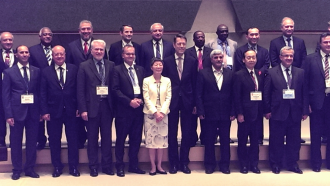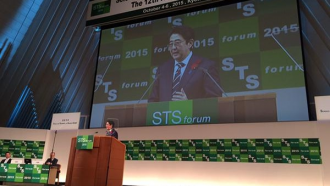When delivering at the Science and Technology Minister’s Roundtable, József Pálinkás, President of the National Research, Development and Innovation Office, as participant from Hungarian side, pointed out the duties of innovation in decreasing social inequalities.
After the greeting words of founder chairman Koji Omi, the forum organised for the 12thtime was opened by Abe Shinzo, Prime Minister of Japan. In his speech he stressed that his government viewed the role of research, development and innovation as a special stimulus for economy, and was committed to create ecosystems where innovation bore further innovation. “Lights and Shadows”: this year’s motto of the forum reflects how controversial the role of science and technology is in solving global tasks. Since controlling energy hunger versus climate change, coping terrorism and world-scale diseases, or assessing potential health and nutrition benefits against ethical factors in cloning technology, all mean not just opportunities but enormous risks and responsibility.
This time, the Ministerial Roundtable involving more than thirty ministers responsible for research and development, focused on inclusive innovation strategies and the role of international RDI cooperation projects in them. Though ministers from various countries set different priorities, they all agreed on the necessity to ensure knowledge sharing, exchange of best practices, access to education, open data management, as well as inclusion of broader society while exploiting results. In his presentation, József Pálinkás emphasised: science of the last two centuries has enriched mankind with great impulses, but also contributed to social inequalities and the endangerment of our environment. However, these inequalities have become obstacles to further development by now, therefore it is the responsibility of decision-makers in policy, business and funding to change that. While most of the innovation has so far served the profit and comfort of the privileged 5% of the society, from now on we have to turn much more efforts to satisfy the basic needs of broader population. For ageing societies, key priorities are new innovative solutions in healthcare and care for the seniors, while in developing societies inclusive innovation should focus rather on fields like supplying clean water and affordable energy as well as securing basic medication, said the President of the NRDI Office. That is a target to be supported even if it involves a temporary negative impact on the profit of the privileged ones. It also should mean a change of attitude by lots of people, in the media for instance, where introducing a new smartphone on the market nowadays evokes significantly higher coverage than supplying people with potable water in a remote African area.
Within the framework of the forum, also the leaders of the national RDI funding agencies had a good chance to discuss how the existing differences benefit the research and innovation activities. President József Pálinkás described the Hungarian R&D funding system and briefly reviewed the main programmes in his contribution. He stressed the necessity of diverse tools, forms and schemes of subsidies, to make such investments more profitable. Promoting wide international cooperation and trans-disciplinary research is also considered important, since a synergy of disciplines once restricted by walls may open up new dimensions of development. Besides, in no conflict with erudition, particular aspects such as gender equality and the researcher careers lifecycle must also be taken into fair consideration. Participants of the meeting agreed to keep on assisting each other by summing up the best practices which they would present as recommendation to the forthcoming session of the Global Research Council (GRC).
|
|
||||
|
|||||









